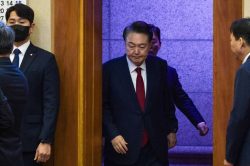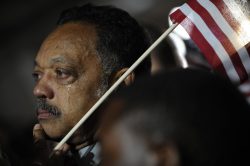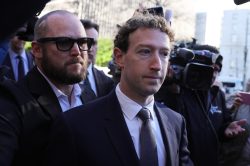
Jan. 6 committee members, from left, Chairman Bennie Thompson, D-Miss., Vice Chair Liz Cheney, R-Wyo., and Rep. Jamie Raskin, D-Md., during Tuesday’s hearing.
12:59 JST, July 13, 2022
WASHINGTON – Rep. Liz Cheney, R-Wyo., ended Tuesday’s hearing of the House committee investigating the Jan. 6, 2021, attack on the Capitol with a direct warning to former president Donald Trump.
Sometime in the past two weeks, Cheney said, Trump tried to call someone whom she identified as a witness who has not yet appeared in the committee’s hearings. The person didn’t take the call and instead alerted their lawyer, who in turn told the committee. The committee reported the call to the Justice Department, Cheney said, suggesting the possibility of a crime.
“Let me say one more time,” Cheney, the panel’s vice chair, said at the hearing. “We will take any effort to influence witness testimony very seriously.”
The revelation was extraordinary because the call allegedly came from Trump himself, rather than an intermediary, and followed a warning at the committee’s previous hearing on June 28 about messages to one of the committee’s witnesses. A person familiar with the committee’s work said both messages that Cheney read out loud during that earlier hearing were directed to Cassidy Hutchinson, a former Trump White House aide who was that day’s star witness.
The former president has called witnesses throughout the Jan. 6 investigation, according to people familiar with the matter, who spoke on the condition of anonymity to reveal confidential conversations. The people familiar with the matter ruled out a number of former officials as the recipient of the latest call highlighted by Cheney, saying it was not former White House counsel Pat Cipollone; his deputy, Patrick Philbin; former media officials Sarah Matthews or Judd Deere; or former campaign manager Brad Parscale. Matthews is expected to appear publicly at the next and possibly final hearing, people with knowledge of the plans said.
A Cheney spokesman declined to answer questions about whether Trump left a voice mail, the identity of the witness or whether the committee has evidence the call was definitely about the Jan. 6 committee.
A spokesman for Trump declined to comment on who the former president may have called. “The media has become pawns of the Unselect Committee,” the spokesman, Taylor Budowich, said, using a frequent Trump phrase for the House select committee. “Liz Cheney continues to traffic in innuendos and lies that go unchallenged, unconfirmed, but repeated as fact because the narrative is more important than the truth.”
It is a crime to pressure someone to lie to government investigators. But prosecutions for witness tampering usually involve at least one witness and a form of corroboration such as a message sent in writing or a tape recording. Without a better indication of what Trump said, it could be hard to make a legal case, experts said.
“There are a lot of open questions here given that this doesn’t appear to be a completed call,” said Andrew Weissmann, a member of the special counsel’s investigation into Russian interference in the 2016 election. “The thing that’s surprising to me is the foolhardiness of making that call yourself. It suggests potentially that his circle of people willing to do his bidding may be narrowing.”
Jason Miller, a longtime adviser to Trump, criticized Cheney’s disclosure as a publicity stunt rather than a serious legal concern.
“It’s a classic political misdirection play,” said Miller, who has testified to the committee. “Cheney and the committee knew they didn’t have anything referable in regards to President Trump today.”
Cheney has been fastidious about ending each of the committee’s seven hearings with a tantalizing revelation, and advisers say she reviews the scripts carefully and is trying to make people understand the committee’s work and want to keep tuning in. Her office usually declines to say more than what she says publicly. She has also studied how impeachment trials and other investigatory hearings have failed in her estimation.
Trump and his allies have a long history of pressuring witnesses to protect the boss from legal jeopardy, with varying degrees of subtlety. At the previous hearing, Cheney quoted from the witness’s account of one of the contacts: A person called, saying someone “let me know you have your deposition tomorrow. He wants me to let you know he’s thinking about you. He knows you’re loyal and you’re going to do the right thing when you go in for your deposition.”
During special counsel Robert Mueller’s investigation into Russian interference in the 2016 election to help Trump, longtime Trump confidant Roger Stone was charged with urging radio host Randy Credico not to cooperate with congressional investigators, including by threatening Credico’s dog. The indictment included quoted emails and text messages. Stone was convicted of witness tampering, but Trump pardoned him in December 2020.
The special counsel’s report quoted an email that Trump lawyer Rudy Giuliani relayed to Michael Cohen, Trump’s fixer who was about to turn against his boss. “You are ‘loved,'” the email said. “Sleep well tonight . . . you have friends in high places.”
Similarly, a lawyer for Trump sent a voice mail to an attorney for Michael Flynn, the former national security adviser who was considering cooperating with the special counsel investigation, reminding Flynn “what we’ve always said about the president and his feelings toward Flynn and that still remains.”
Former Trump campaign manager Paul Manafort, who was also charged in the Russia probe, was ordered back to jail in 2018 after prosecutors said he and an associate contacted two members of a public relations firm asking them to falsely testify about secret lobbying. The prosecutors’ case included texts and phone calls, as well as an affidavit from one of the people Manafort called. Trump pardoned Manafort, as well.
In addition, Mueller’s report on the Russia investigation found that Trump wanted then-White House Counsel Donald McGahn to write a memo denying that Trump wanted to fire Mueller, which would have contradicted a deposition McGahn had already given.
Close congressional ally Matt Gaetz, R-Fla., also faced an ethics inquiry for tweeting about Cohen before his testimony to a House committee in 2019. “Do your wife & father-in-law know about your girlfriends? Maybe tonight would be a good time for that chat. I wonder if she’ll remain faithful when you’re in prison. She’s about to learn a lot.” Gaetz apologized and deleted the message. The House Ethics Committee criticized Gaetz but concluded he did not violate laws against witness tampering.
Top Articles in News Services
-

Survey Shows False Election Info Perceived as True
-

Prudential Life Expected to Face Inspection over Fraud
-

Hong Kong Ex-Publisher Jimmy Lai’s Sentence Raises International Outcry as China Defends It
-

Japan’s Nikkei Stock Average Touches 58,000 as Yen, Jgbs Rally on Election Fallout (UPDATE 1)
-

Trump Names Former Federal Reserve Governor Warsh as the Next Fed Chair, Replacing Powell
JN ACCESS RANKING
-

Japan PM Takaichi’s Cabinet Resigns en Masse
-

Japan Institute to Use Domestic Commercial Optical Lattice Clock to Set Japan Standard Time
-

Israeli Ambassador to Japan Speaks about Japan’s Role in the Reconstruction of Gaza
-

Man Infected with Measles May Have Come in Contact with Many People in Tokyo, Went to Store, Restaurant Around When Symptoms Emerged
-

Man Infected with Measles Reportedly Dined at Restaurant in Tokyo Station























